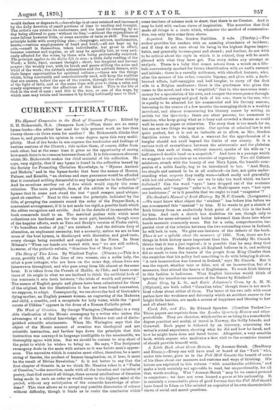Acquitted. By Mrs. Gordon Smithies. 3 vols. (Tinsley.)—The author provides
her readers with an amazing abundance of incident; and if they do not care about its being in the highest degree impro- bable, and generally inconsequent and absurd ; and further, do not wish to be critical about the style in which it is related, they will be much pleased with what they have got. The story defies any attempt at analysis. There is a baby that comes ashore from a wreck on a life- belt, conveniently marked for future identification with an earl's coronet and initials ; there is a rascally nobleman, with chiselled features, who, after the manner of his order, commits bigamy, and plots with a dark- brewed villain, half-smuggler and half-burglar, to carry off the first wife to a Belgian madhouse ; there is the gentleman who gives the name to the novel, and who is "acquitted," that is, who uses some trust- money for a speculation of his own, and escapes the consequence through the marvellous energy and good luck of his son ; there is the son, who i8 equally to be admired for his commercial and his literary success, becoming in the course of a few months the managing clerk to a wealthy merchant, and almost commencing his literary career by writing an article for the Quarterly ; there are other persons, too numerous to mention, who keep going what as is busy and crowded a drama as could well be seen on paper or otherwise. The story then is too much for us, but one or two things we may note. Our system of criminal law is not quite perfect, but it is not so imbecile as to allow, as Mrs. Gordon Smithies seems to think, that a warrant for the apprehension of a burglar should not avail beyond the limits of one county. It is a curious trait of resemblance between the aristocratic and the plebeian villains, that each of them, without concert, speaks of his wife as "a half-starved death's head on a mopstick." And here is a passage which we suggest to our readers as an exercise of ingenuity. Two old Cabinet ministers, struck with the beauty of one Mary Lynn, the humble com- panion of a noble family, beg to bo introduced to her. "And Mary, too simple and natural to be at all confused—in fact, not quite under- standing what magnets they really were—talked easily and gracefully with her old admirers." How are we to take the word which we have italicized? Can the word "eyes" have dropped out of the sentence somewhere, and "magnets" refer to it, as Shakespeare says, "her eyes are loadstones ;" or is it possible that we ought to read "magnates "?






























 Previous page
Previous page